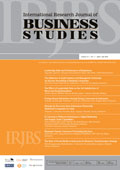Article Metrics |
|
|
Stakeholder Analysis on Indonesian E-Commerce Taxation
Abstract
Trade industry had been effected significantly by the high pace of digitalization. The growth level of Indonesian online trading activities is predicted to be extremely high because of the huge number of internet users in Indonesia. This is perceived as a great chance to enter the online commercial trading market in Indonesia. The interactive online marketplace makes it easy to buy and sell goods and services more efficiently in everywhere and at any time. However, there is little consideration on the taxation aspect of e-commerce transaction in Indonesia as developing country. This study gives an analysis on Indonesian e-commerce taxation based on identified main group of stakeholders. The literature review is conducted to get comprehensive understanding on common e-commerce taxation. The analysis of e-commerce taxation grasps the comparison of practices between developed and developing countries.
Keywords:
Taxation, E-commerce, Stakeholder Analysis
* Accounting Department, Faculty of Economics, Parahyangan Catholic University, Gedung 9, Jl. Ciumbuleuit 94, Bandung 40141, Indonesia.
Full Text:
References
Allen, S. T. (2013). Adapting to the Internet: Why Legislation Is Needed to Address the Preference for Online Sales That Deprives States of Tax Revenue. The Tax Lawyer, 66(4), 939-960.
Aquilio, M. (2016). The Commerce Clause, State Taxation, and The Internal Consistency Test. Journal of Business Behavioral Sciences, 28(1), 32-41.
Aziz, A. (2018). Keadilan untuk Semua Kalangan. Jakarta: Direktorat Jenderal Pajak.
Beloborodova, A. L., & Martynova, O. V. (2016). Trend of Online Trading Development in Russia. Journal of Economics and Economic Education Research, 17(1), 9-17.
Bharadwaj, P. N., & Soni, R. G. (2007). E-Commerce Usage and Perception of E-Commerce Issues among Small Firms: Results and Implications from Empirical Study. Journal of Small Business Management, 45(4), 501-521.
Blackman, R. (2003). Project Cycle Management. Teddington: Tearfund.
Blythe, S. E. (2012). The Legal Environment of Romanian E-Commerce: A Critical Analysis and Recommendations for Improvement. Economics, Management, and Financial Markets, 7(4), 440–452.
Budi, C. (2018). Menyasar Pajak Transaksi e-Commerce. Jakarta: Direktorat Jenderal Pajak Kementerian Keuangan.
Carnaghan, C., Downer, P., Klassen, K., & Pittman, J. (2004). E-Commerce and Tax Planning: Canadian Experiences. Canadian Accounting Perspectives, 3(2), 261-288.
Deaconu, A., & Cuzdriorean, D. D. (2016). On the Tax-accounting Linkage in the European Emerging Context. Journal of Accounting in Emerging Economies, 6(3), 206-231.
Dewi, I. K. (2018). Tidak Ada Jenis Pajak Baru. Jakarta: Direktorat Jenderal Pajak.
Direktur Jenderal Pajak. (2013). Penegasan Ketentuan Perpajakan atas Transaksi E-Commerce. Jakarta: Direktur Jenderal Pajak.
Gordon-Murnane, L. (2000). E-commerce and Internet Taxation: Issues, Organization, and Findings. Searcher, 48-55.
Gupta, A. (2015). Problems Of Double Taxation In India- A Case For Progressive GST (Goods and Services Tax). Journal of Commerce and Management Thought, 6(3), 456-476.
Hayyu, P. (2018). Kesetaraan Pajak bagi Pelapak. Jakarta: Direktorat Jenderal Pajak.
Hellerstein, W. (2016). Taxing Remote Sales in The Digital Age: A Global Perspective. America University Law Review, 65(1), 1195-1240.
Hutchens, R. (2015). Desperate Times Call for Desperate Measures: States Lead Misguided Offensive to Enforce Sales Tax Against Online Retailers. Vanderbilt Law Review, 68(2), 575-608.
International Finance Corporation. (2007). Stakeholder Engagement: A Good Practice Handbook for Companies Doing Business in Emerging Markets. Washington: International Finance Corporation.
Johnston, G., & Pienaar, S. (2013). Value-Added Tax On Virtual World Transactions: A South African Perspective. International Business & Economics Research Journal, 12(1), 71-80.
Lomanto, C. N., & Mangoting, Y. (2013). Perlakuan PPN atas Transaksi E-commerce. Tax & Accounting Review, 3(2), 1-9.
Moran, J. E., & Kummer, J. (2003). US and International Taxation of the Internet: Part 2. Computer and Internet Lawyer, 16-24.
Nainggolan, J. (2018, Februari 21). Ekonomi dan Bisnis. Retrieved from Kantor Berita Politik: http://ekbis.rmol.co/read/2018/02/21/327520/Dua-Tahun-Terakhir-Pengguna-Internet-Di-Indonesia-Meningkat-
O'Brien, J., & Marakas, G. M. (2011). Management Information Systems (10th. ed.). New York: McGraw-Hill/Irwin.
Organization for Economic Cooperation and Development. (2014). Consumption Tax Trends 2014 - Taxing Consumption. Paris: Organization for Economic Cooperation and Development.
Organization for Economic Cooperation and Development. (2017). Regulatory Policy in Korea. Korea: Organization for Economic Cooperation and Development.
Pangesti, R. D. (20174). Menguak Permasalahan Perpajakan E- commerce di Indonesia dan Solusi Pemecahannya. Jurnal Riset, 2(1), 180-201.
Pastukhov, O. (2010). Will Internet Businesses Ever Become Interested in Complying with Tax Laws? Intellectual Property & Technology Law Journal, 22(8), 10-24.
Peiris, P. M., Kulkarni, D., & Mawatha, C. R. (2015). An Empirical Study of Customer Adoption of E-Commerce: A Customer Trust Model to Support the Adoption of E-Commerce Among Small- and Medium-Sized Enterprises in Sri Lanka. International Journal of Business and Information, 10(4), 491-520.
Pinto, D. (2005). Alternatives for Taxing E-Commerce. Journal of International Taxation, 14-23.
Pinto, D. (2006). "Conservative" and "Radical" : Alternative for Taxing E-Commerce. Journal of International Taxation, 38-62.
Quezada, R. G. (2012). Pluralist University Government. An Analysis Proposal Based on Stakeholder Theory. Universities and Knowledge Society Journal, 296-310.
RI. (2018). Kesetaraan Pajak Untuk E-commerce. Jakarta: RI.
Sakti, N. W. (2014). Pajak E-Commerce, antara Hambatan dan Tantangan. Jakarta: Inside Tax.
Sakti, N. W. (2018). Jakarta: Direktorat Jenderal Pajak.
Scarle, S., Arnab, S., Petridis, I. D., Protopsaltis, A., & Freitas, S. d. (2012). E-commerce transactions in a virtual environment: virtual transactions. Electronic Commerce Research, 12(1), 379-407.
Sinyor, A. (2002). EU VAT on e-commerce: The practical Implications. International Tax Review, 32-33.
Sirimanna, B. (2017, May 21). Business Times. Retrieved October 31, 2018, from Sunday Times: http://www.sundaytimes.lk/170521/business-times/online-transactions-to-be-taxed-240518.html
Spencer, D. (2014). Tax Challenges of the Digital Economy. Journal of International Taxation, 35-47.
Stanley-Smith, J., & Schwanke, A. (2015). GST to be enforced on e-commerce in New Zealand. London: International Tax Review.
Stitilis, D., & Rotomskis, I. (2010). A Model for Resolving Consumer Dispute in Electronic Commerce in Lithuania. Intellectual Economics, 1(7), 55-62.
Sumanjeet. (2010). The state of e-commerce laws in India: a review of Information Technology Act. International Journal of Law and Management, 52(4), 265.
Tannewald, R. (2001). Are Staet and Local Revenue Systems Become Obsolate. New England Economic Review(4), 27-43.
Taylor, B. M. (2013). Back to Basic: Using Existing Tax Collection Practices to Increase Use Tax Compliance. Fordham Journal of Corporate & Financial Law, 18(4), 1089-1136.
Tobing, G. C., & F, G. (2014). Pajak Dunia Bisnis Digital. Jakarta: Inside Tax.
United Nation. (2014). World Economic Situation and Prospect - Country Classification. New York: United Nation.
United Nations. (2018). World Economic Situation and Prospects 2018. New York: United Nations.
Copyright (c) 2019 INTERNATIONAL RESEARCH JOURNAL OF BUSINESS STUDIES
International Research Journal of Business Studies has been covered by the following services: | ||||||||||||||||||||||||
|




















